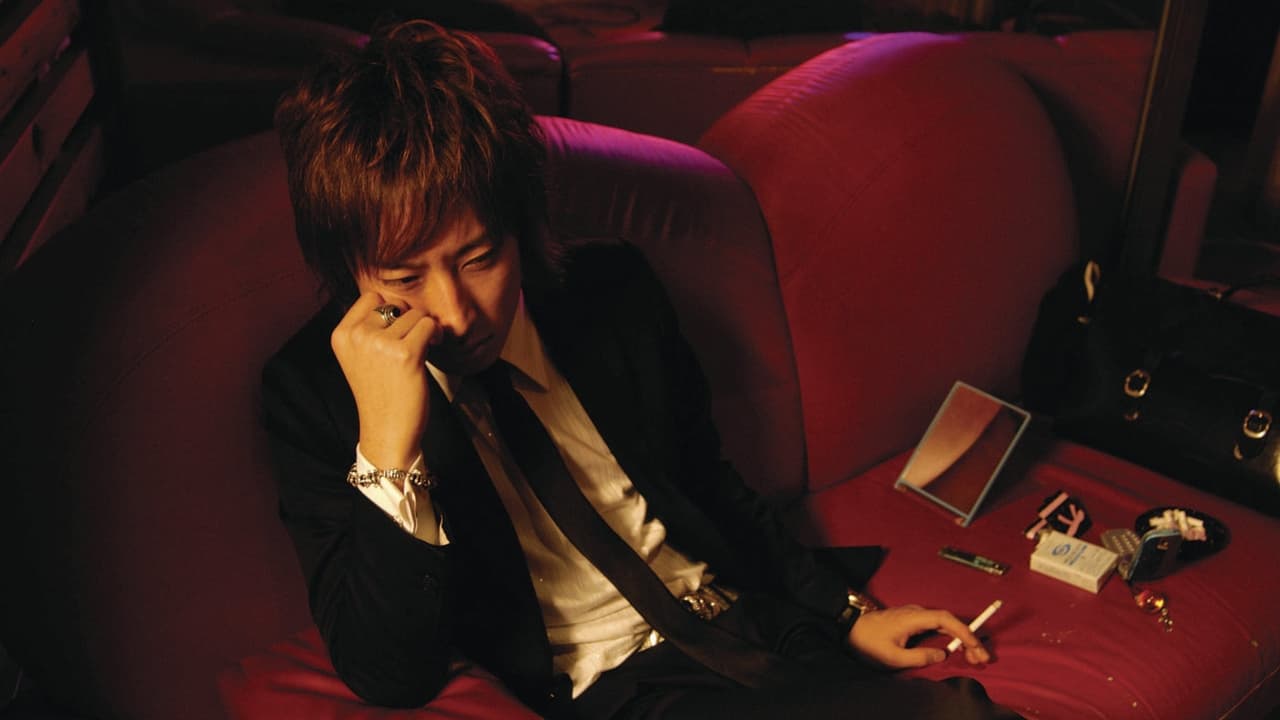

A wonderful look at the world of hosting in Osaka, where young pretty boys preen and hone the art of fulfilling - incompletely - the fantasies of their female clients at a tragic cost. In a refreshing change from the trend of centering every documentary on the documentary's maker, Jake Clennell stays off camera and is rarely heard. The staff and clientèle of host club Rakkyo Café are free to reveal their stories and insights without interference or dramatizations. Neither are needed as the stories are riveting. Unappreciated sacrifices and unfulfilled desires clash with deceit and opportunism in an atmosphere ruled by cold business ethics and marketed emotions. Clennell structures the narratives beautifully, winding through the artifice to the underlying truth as a night at the club unfolds. By the closing scenes of spent hosts staggering home in the early Osakan morning it's hard not to empathize with their emptiness or envy their bank accounts. One of the best documentaries I've seen, the main complaint is clocking in at just over seventy minutes it's too short. Worth hunting down.
... View MoreCafé Rakkyo is a host pub, where young men act as hosts to young women who pay them for their time. This can involve sex but a good host will keep that for as long as possible because often a customer will leave him and not come back once she has had everything he can offer. The hosts earn about US$10,000 US$50,000 each month and are mostly young men. The owner of the Raffyo café is Issei, one of the most popular hosts out of his staff of twenty, acts as our way into this strange world of underground love and friendship.A supremely odd film this one, well, a film of a supremely odd world anyway. I cannot think of anything like it in the UK. Even with the sexes reversed, strip clubs and escorts are very much about money for sex or sexual favours, I can't think of services where women can hang around with men in clubs in the way I saw within this film. I think the film recognises this because it structures itself as a gentle way in to the world for the uninitiated. At first the film just explains it and lets us see the club, listen to the hosts and the girls who come for their company talking about love and longing. However the "twists" come once we understand as the film starts to push below the superficial workings of the club and get a bit more into the people who pay and get paid.Most of the girls we hear from seem to work in a similar industry as the male hosts and their reasons for going to the club seems to be as part of a healing process. The overwhelming impression is of how fake it all is and how empty the lives be. It put me in mind of the line from Common's most recent album where he talks about a stripper when he says "at first stripping seemed so empowering, Most every girl wanna do it now and then, But being meat every day is devouring" because you can see the emotional damage being done within this world where everything is purchased and a transaction everyone seems to want the real thing but nobody has it. Some show the cracks but most have it hidden but it does come out the film wisely keeps the signs of stress and damage till the end, again giving a strong structure.Overall a very good film about a very strange world. Being so remote from this sort of experience the film could have left me cold but the structure of the film makes it work really well and produces an interesting and quite emotional documentary.
... View MoreSometimes one can feel that one already knows everything there is to know about the world; but sometimes a film, such as this craftily revealing documentary, provides insights into another culture that seem wholly alien and strange. The subject of 'The Great Happiness Space' is Japan's host bar scene, where women pay for the company of men. At first, this intrigues because of the reversal of the sexes compared to the normal client-prostitute relationship. Soon, one makes new observations: that the hosts are very much "pretty boys", not the heaving hulks of unadulterated masculinity that are often held up as the female ideal, at least in the west; and secondly, that the women themselves are young and attractive, a long way from the stereotype of the average man who pays for women's services. Nor do they resemble the stereotype of Japanese women, quiet and demure; in the bars, they are drunken ladettes, and indeed, their relationships with their hosts seem more like those of groupies to rock stars than of punters to whores. In fact, in accordance with common opinions about female desire, but in contrast to normal practice in the sex industry, physical contact, while it often happens, is not what the women pay for; indeed, the men try to avoid it, as what keeps their clients coming back is the eternally unfulfilled promise of love. In one sense, the hosts are performing a con-trick, by selling this promise; but one also thinks, surely the women are willingly deluded. But when one learns the fantastic sums that the clients pay for this privilege, this phenomenon suddenly no longer seems so benign. But how can they afford to pay so much? The answer is, circularly, that most of the clients (at least, the high-spending ones), are also sex workers. In some ways, this makes sense: it explains their affluence, their craving for cathartic recreation, their floating of social norms, and also, perhaps, their willingness to pay for love not sex; yet in another sense, it seems wholly bizarre that those who practice the arts of illusion on their own clients should nonetheless fall so completely for the deceptions of their hosts. They also seem a little too like "nice girls" to be prostitutes, until it is implied that many actually take up prostitution to feed their habit; a healthier habit, perhaps, then heroin and the other drugs that prostitutes are stereotypically addicted to; but, it seems, one just as compelling.There's something deeply sad about all this, and yet it never feels sordid: the mutually sustained illusion hides the shockingly expensive transaction that lies behind the party, and the dream. And the girls, though surely headed for a fall, seem strangely calm and contented with their delusions, while their playboy hosts are, in the final scene, shown exhausted and hung-over, physically and perhaps morally exhausted by their work. And relating this scene to anything western seems very hard, even though it has arisen in response to universal urges. Truly, we live in a strange, varied, and tragic world.
... View MoreI don't know What movie that last commenter was watching, but it sure as hell wasn't this one. This is a depressing, depressing film, and you will NOT learn any sex tricks in this movie -- in fact, no one actually gets laid at these host clubs. Nor will you learn how to anything about pleasing a woman, nor anything about charm: these youngsters engage in a frightening deathlike ritual, where the traditional courtship rituals are endlessly repeated, completely emptied out of any spontaneity or novelty."I would die for Issei" -- one girl proclaims -- little wonder, since every single one of their actions seem to reach out for death.Is Japan the death intrinsic to modern life? The naiveté of more maddeningly superficial examinations of Japan (e.g. the insufferable Lost in Translation) attempt to delimit the borders of life and death in terms of the most superficial and ethnocentric terms. But, the power of documentary comes from the ultimate NEGATING of racial difference in search of a more fundamental ground for the determination of life and death -- and in the sympathy in which these characters are portrayed and the philosophical clarity in which these characters speak (The Japanese, introspective, sentimental, and highly educated, are naturally drawn towards a certain form of philosophy) we find the possibility of thinking the death of all civilizations.
... View More